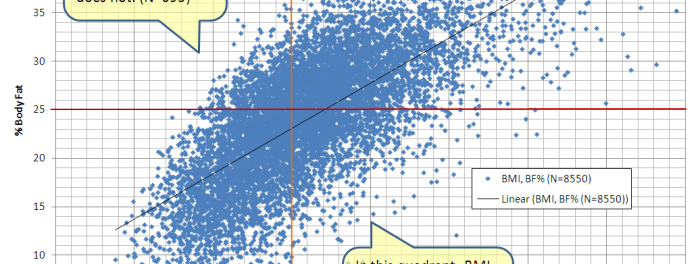Blindness to costs
Evidence helps me make decisions when the cost of intervention is high and immediate. Once I make the cut, I can never take it back. There are no do-overs and the damage I personally inflict on a patient is instant. Surgery is a calculated intentional harm for the chance at a net gain. This is in contrast to exercise and nutrition where change is more gradual and where the cost of intervention is perceived (rightly or wrongly) as mostly time and this vague thing we call effort. But the immediacy of time should not be overlooked as a high cost. Perhaps therein lies the rub: fitness “professionals” fail to see the costs of their own interventions; because if you could see that high cost, you would use EVERY resource available to you to make the right decision. Read More...
Animal Farm Evidence: Some studies are not more equal than others.
 Something interesting happened today. A social media post went out about a study showing an association between strength training in individuals older than 65 years of age and all-cause mortality.
Something interesting happened today. A social media post went out about a study showing an association between strength training in individuals older than 65 years of age and all-cause mortality.
This, of course, was re-posted and praised in the echoes that followed because nothing feels quite so good as being “right” about your choices. Read More...
STAHP! Please, just STAHP.
 There’s a dark humour quote in surgery, “There is no surgery so simple that a resident can’t screw it up.” I’ve decided to make up an adage, “There is no concept or idea that the fitness/nutrition industry can’t corrupt,” because I never thought I would have to ever, ever, write a post like this.
There’s a dark humour quote in surgery, “There is no surgery so simple that a resident can’t screw it up.” I’ve decided to make up an adage, “There is no concept or idea that the fitness/nutrition industry can’t corrupt,” because I never thought I would have to ever, ever, write a post like this.
It astonishes me that there is now a clear line in the sand between “evidence-based” trainers and non-“evidence-based” trainers. There’s even a third camp, which I’ll nick-name the “anti-evidence-based” trainers, where it’s not just a passive, I-don’t-really-read-much-research, but an active, I-explicitly-ignore-and-deride-research. Read More...
Why Asians are thinner: On Cultural Reduction and Health (Contains offensive language)
 Recently, a very prominent website published an article on why Asians tend to be thinner than what I can only presume to be Caucasians (as the writer is Caucasian). It’s not the first article on this topic and it won’t be the last (there is, after all, an entire field of study on comparing cultural behaviours and “health”. Whether this is a worthwhile field or not, I have yet to decide), but the treatment of the material was so completely out-to-lunch racist, that I could not fight posting about it.
Recently, a very prominent website published an article on why Asians tend to be thinner than what I can only presume to be Caucasians (as the writer is Caucasian). It’s not the first article on this topic and it won’t be the last (there is, after all, an entire field of study on comparing cultural behaviours and “health”. Whether this is a worthwhile field or not, I have yet to decide), but the treatment of the material was so completely out-to-lunch racist, that I could not fight posting about it.
The colonial narrative is healthy and strong, even in the fitness world. Other cultures become exoticized and romanticized as though they are not really part of the world of the writer. It’s both disappointing and amusing to read until you realize that the entire premise of such stories is to separate, perpetuating a ‘them vs us’ mentality, particularly when based on a thoroughly inadequate experience of what it means to be of another culture (This petition was created in response to a newspaper article on Filipino cuisine as experienced by a naive Caucasian traveller). It results in the inappropriate homogenization of many cultures under a single, reduced label. This essentially invalidates the richness of what it means to experience any one of those cultures expressed in a myriad of combinations. Read More...
The BMI: Lack of basic epidemiology knowledge makes us all dumber
This graph bothers me. The article from the New York Times bothers me more. For a long time I couldn’t figure out why. I’ve given talks on BMI, the history of the BMI and my practice of plastic surgery is permeated by the BMI. My opinion of the BMI has swung to both extremes—as a measurement that is junk, to a useful epidemiological tool, but not as a personal measurement, and now to something different entirely. I realized this because the graph bothered me; and the reason why it bothers me is because there is a fundamental construct problem with how the BMI is perceived; and when I say BMI, I mean the BMI cut-offs, because really, there is nothing wrong with dividing weights and heights. Read More...
All studies are wrong, unless they’re not
 You know me. I’m always late to the internet parties.
You know me. I’m always late to the internet parties.
Recently, a few more click-bait sites have gone on to talk about how most research findings are false. A few months ago, the article, “Why you shouldn’t believe that exciting new medical study.” was making the rounds or, as the young folks say, “trending”. Yes, it has taken me that long to get my thoughts together on it. Read More...
Systematic Reviews: All that glitters is not gold.
This is a short article I submitted to Science-Based Medicine a couple of years ago, which never made it to their blog and then I forgot about it. But then I came across it and figured I should use it since I already did the work; and lately there seem to be a lot of systematic reviews being published. Read More...
The art of the absence of evidence

Barrett Newman’s Voice of Fire: http://en.wikipedia.org/wiki/Voice_of_Fire#/media/File:Voice_of_Fire_photo.jpg
This study comes from Ian Lane who asked whether the authors were, “entitled to believe that their conclusion is ‘true’.” Read More...
50 ways to take a better poop

An actual ad that I passed by whilst on the escalator on the Hong Kong subway for a ‘digestive aid’ targeted at women
Everybody poops. You don’t even have to learn how, unless it’s important to go in the potty (and it is.) So really, this is going to be a single item list: Read More...
Protein synthesis and muscle hypertrophy: No more proxies

Taken from: http://nomoremutants.com/
Frankly, I’m surprised this study didn’t make more of a splash. I think this is a huge finding, even if it does require further work (but really, what study doesn’t end in, “More research is required…”? I can’t even imagine what would happen if someone wrote, “No further research is required.” Probably a rain of frogs, I suspect.) Read More...




